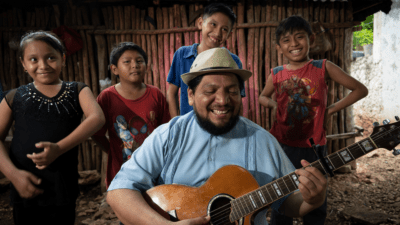This post is also available in: Español (Spanish) Kreyòl (Haitian Creole)
Mission, Texas is regarded as one of the citrus capitals of the south. For over 90 years, the city has hosted the annual Texas Citrus Fiesta.
Yet, when Mission Consolidated Independent School District (ISD) students were served oranges at lunchtime, the fruit they ate had come by way of California.
Alexis Racelis, director of the agroecology program at the University of Texas Rio Grande Valley (UTRGV) – a Hispanic Serving Institution (HSI) – and co-director of the school’s Center for Sustainable Agriculture and Rural Advancement (SARA), said a conversation about food procurement was needed between the buyers from the ISD and regional farmers.
“You’re talking about citrus that has traveled 1,600 miles to feed Mission students, when there are five or six farms within five miles of their school district, some of whom are small family farms that are certified organic, farming with respect for their land and laborers, and still struggling as an enterprise,” Racelis said. “That said, there are other growers who are using basically all means necessary to try and produce food – conventional ways that are highly reliant on chemicals and pesticides and fossil fuels. In either case, all of that food leaves the region – almost none of it feeds the local population. So, all we’re left with are the are the impacts of the footprint of agriculture, but not necessarily the food.”
Building resilient food systems
With $250,000 in support from the W.K. Kellogg Foundation (WKKF) through its social impact bond, SARA helped facilitate discussions. Mission Consolidated Independent School District (CISD) then agreed to purchase citrus for its students from local farms beginning in February of 2023.
The disconnect between the school system and local food producers represented one of the paradoxes of the Rio Grande Valley, where more than 90% of residents identify as Hispanic/Latino. It is one of the great agricultural hubs of the U.S., yet also faces some of the most serious health challenges in the country, with high rates of comorbidities, food insecurity and poverty.
Through the capacity building grant, SARA has worked to expand and accelerate efforts to build resilient and equitable food systems in Rio Grande Valley by engaging with local community partners by hosting monthly meetings with a working group composed of members from municipal governments, local businesses, farmers, educators, community based organizations, and other community advocates. It has also done so by expanding collaboration between SARA, the UTRGV Hub of Prosperity Farms and other community-based partners in the region who provide technical assistance and capacity building in food and agriculture.
Racelis, who holds the Houston Endowed Chair in Science and Technology and is one of 28 members of the USDA’s Equity Commission, said supporting growers benefits the entire region.
“The more that we can support local farmers, the better it is, because they tend to be the ones with the land ethic to want to use better practices. They’re the ones who tend to treat their employees fairer, they’re the ones who contribute to our local economies and they’re the ones who are embedded in the identity of our region.”
– Alexis Racelis
Changing how we think about food
As part of the WKKF grant, SARA hosted its first Food Summit Earth Fest in April of 2023 at the UTRGV Edinburg Campus. The three-day event highlighted the region’s approach to an equitable food system and set the stage for future planning. The summit included panel discussions about farmworker rights, community action and cooperation, policy change, food access and food security, as well as a youth panel discussion on the future of food.
Marcos Cano, an 11th-grader at Mission CISD, spoke of his experience working with the Mission CISD F.A.R.M.E.R.S. (Farmers, Agriculturists, Ranchers, Machinists, Engineers, Researchers, Suppliers) program during the youth panel discussion.
“It’s not just a class. It’s a passion,” Cano said. “You’re going to have to be on the ground and you’re going to have to dig. But the reward you get from seeing a small seed turn into a beautiful plant that is growing is not something you can buy or see somewhere else. It’s something you have to experience. It’s probably the greatest feeling I’ve experienced in class. This has helped me think about my food.”
Advancing programs with local school districts is one of the ways SARA is seeking to implement policy change at the municipal level, while also leveraging federal dollars to strengthen the ecosystem of the Rio Grande Valley.
During a panel discussion about food access in colonias and food deserts, Kate Fitzgerald of the U.S. Department of Agriculture (USDA) noted that the COVID-19 pandemic brought to light the fragility of the food supply chain.
“With this administration and after the experiences of COVID, there is a seminal moment, and for the first time there is an acceptance and understanding by Congress that something went drastically wrong with the food system when COVID hit,” Fitzgerald told the audience. “The idea that you could just not buy meat – and now food inflation is taking a bite out of everybody – the crisis made these strains apparent for the first time. And sometimes it takes a crisis to be able to move forward. So, Congress allocated money to USDA very explicitly: fix the food supply chain. And what the USDA has done is allocate funds to specific programs designed to meet the specific gaps that became apparent.”
In July 2023, the USDA launched the Regional Food Business Center Program, with the Rio Grande colonias selected as one of 12 national sites. Through the program, small and mid-sized food producers and food businesses receive localized assistance via coordination, technical assistance and capacity building.
The Regional Food Business Center program is part of a mandate to improve farm and food business, income viability and sustainability in the region, with a particular emphasis on investing in communities, producers and businesses that have been historically underinvested by the USDA.
“It’s thinking about the work through the lens of small business to small business, locally owned to locally owned,” Fitzgerald said. “Moving away from a concentrated system to a more diverse, competitive system for small businesses that are rooted in a region so they can take advantage of the synergies from coming and working together. That is supposed to be at the heart of these Food Business Centers.”
SARA continues its work to highlight the abundant resources of the Rio Grande Valley that are available for children, families and communities to thrive. At the heart of its work are students at UTRGV, who gain valuable experience in the field of “agroecology” – the study of the ecology of food systems, an applied science to inform the improved management of the ways we produce our food, fuel, and fiber – before branching off into leadership roles in the private and nonprofit sector as agents of change.
“We’re kind of priming the pump,” Racelis said. “So that we’ve got like-minded folks who are working in different agencies, who are able to help us accelerate our work. “







Comments